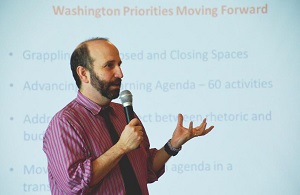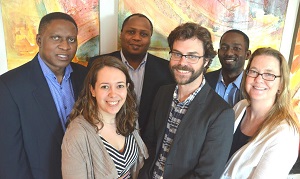Evaluating and Learning from USAID Democracy, Human Rights, and Governance Programming
 The DRG Center and the Policy Planning and Learning Bureau's Office of Learning Evaluation and Research (PPL/LER) organized a week-long Impact Evaluation Learning Clinic in Dar es Salaam, Tanzania from March 23-27. The purpose was to generate rigorous evidence to concretely demonstrate the impact and the difference democracy, human rights, and governance makes in USAID programming.
The DRG Center and the Policy Planning and Learning Bureau's Office of Learning Evaluation and Research (PPL/LER) organized a week-long Impact Evaluation Learning Clinic in Dar es Salaam, Tanzania from March 23-27. The purpose was to generate rigorous evidence to concretely demonstrate the impact and the difference democracy, human rights, and governance makes in USAID programming.
The Clinic brought together DRG technical staff from Missions and USAID/Washington, as well as leading DRG impact evaluation academic experts. A total of 38 applications from field missions were submitted for participation in the Clinic, and seven projects were selected based on how promising they were for designing evidence based DRG activities that lend themselves to rigorous impact evaluation. Participating Missions included: DRC, Haiti, Malawi, Mali, Nepal, Senegal, and West Bank and Gaza.
"These are activities that are new, untested, and are influential or are activities in subsectors where USAID spends a significant amount of money," said Altin Ilirjani, DRG Center Technical Lead for Learning.
The primary objective of the Clinic was to apply the broader social science learning on program design and create new evidence-based DRG activities that lend themselves to experimental impact evaluation methods. The intention was to develop impact evaluations with generalizable results to USAID learning activities across the over 87 countries where USAID operates.
"The Clinic was particularly relevant to the DRG strategy, as we integrate DRG practices across development sectors," said DRG Center Director, Neil Levine. "This requires us to be a learning organization, where we are applying back in the lessons learned on an ongoing basis."
The week was structured around a clinic-based model with workshop and training sessions, led by the academics and USAID Washington staff on topics that included an overview of impact evaluation methods, political economy analysis, local solutions, academic evidence reviews, and political indicators. "I think the DRG Clinic is really successful in that it brings together top notch academics that are well versed in some of the academic studies that interest people working at USAID, and of course USAID Mission Staff," said Matt Winters, University of Illinois at Urbana-Champaign, Assistant Professor of Political Science. Future activity design plans were developed in clinics and presented the last day.
"As a citizen, as well as others in Nepal, we realize that political parties are not very responsive to their constituencies," said Murari Adhikari, USAID/Nepal in regard to how he plans on applying knowledge gained during the Clinic. "They go out for their elections, they win their elections, they forget their promises. So we would like to take these lessons learned from the Clinic and design a very robust impact evaluation to see whether the interventions work."
Follow up on the implementation of the projects will include participants receiving Mission leadership buy in of their projects, after which academics will organize scoping trips to further develop the impact evaluation designs in collaboration with the Missions and implementers. "The DRG Center is going to follow the implementation of the activities throughout the life of the projects," said Altin. "We will also ensure that the knowledge generated will be incorporated into the next generation of DRG foreign assistance activities."
 The DRG Center will also work directly with the Missions on the dissemination plan for the knowledge that will be developed through the impact evaluations, and assist in their completion over the next three to five years. Most of these evaluation projects will be procured through the DRG/LER contract with co-funding from the DRG Center and PPL/LER.
The DRG Center will also work directly with the Missions on the dissemination plan for the knowledge that will be developed through the impact evaluations, and assist in their completion over the next three to five years. Most of these evaluation projects will be procured through the DRG/LER contract with co-funding from the DRG Center and PPL/LER.
"The Clinic allowed me to learn and listen to different lessons from different countries," said Mildred Pantouw, USAID/Indonesia. "And how each country has their unique problems as well as opportunities, as well as how important it is to identify and be specific with a problem and apply the type of methodologies and evaluation to support the intervention."



